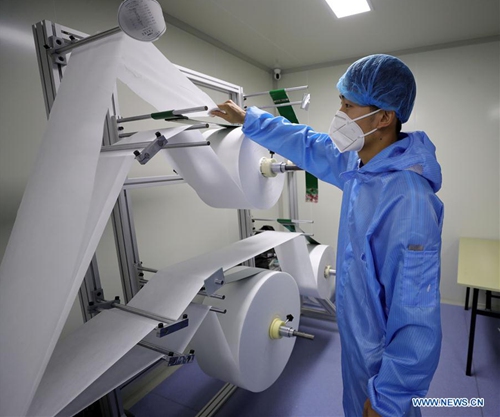China cracks down on profiteers reselling melt-blown fabric for medical masks
By Fan Lingzhi and Zhang Dan Source:Global Times Published: 2020/4/17 20:28:40

A worker produces medical masks at Liaoning Shengjingtang Biotechnology Co., Ltd in Shenyang, capital of northeast China's Liaoning Province, April 14, 2020. The company has been actively manufacturing medical masks that will be exported overseas. (Xinhua/Yang Qing)
In response to organized criminal activities that involved reselling melt-blown fabric to reap large gains, Chinese authorities have cracked down on 42 profiteers involved in 20 cases, with the amount reaching 34.45 million yuan ($4.87 million).
Since the coronavirus outbreak, a few law-breakers have stockpiled and resold melt-blown fabric, the core of medical masks, to seek exorbitant profits through raising prices or arranging fictitious transactions, the Minis-try of Public Security told the Global Times.
As a result, the market price of the fabric has soared almost 12 times, according to industry insider. This has seriously disturbed the nor-mal production order, hurt the legal interests of consumers, and disrupted epidemic pre-vention and control work, the ministry said.
The average price of the melt-blown fabric used to be 50,000 yuan per ton before the coronavirus outbreak, but now it grows to as much as 600,000 to 700,000 yuan per ton, Bai Yu, president of the Medical Appliances Branch of the China Medical Pharmaceutical Material Association, told the Global Times on Friday.
He noted when the pandemic wrought havoc worldwide, the demand and supply of the fab-ric was disrupted, resulting in the rise of the price of the raw materials to make masks.
"As the coronavirus broke out overseas, there is a shortage of the raw materials which drove up the prices of the melt-blown fabric abroad. Consequently, Chinese manufactur-ers followed to raise the prices. But many factories had to buy in order to fulfill the large demand of masks overseas," Bai noted, add-ing one ton of the fabric could produce about a million masks.
On March 9, the local police in Dongguan, South China's Guangdong Province, arrested two criminal suspects who allegedly resold the fabric and reaped exorbitant profits of more than 8.5 million yuan.
The two suspects imported the fabric from India and Argentina through a Chinese trad-ing company and signed a contract for 60 tons of the fabric in mid-February. The pur-chase price was 96,000 yuan per ton.
However, they later signed contracts for more than 50 tons of fabric with companies in East China's Jiangxi and Jiangsu provinces and South China's Guangdong Province with the highest selling price hitting 350,000 yuan per ton - about 3.6 times the purchase price.
The police detained two people, citing alleged illegal business operations.
In addition, 21 people from East China's Zhejiang Province produced more than 10 tons of unqualified melt-blown fabric by ad-justing their production lines formerly used to make sound-proof cotton for autos.
Standard melt-blown fabric should be able to filter out 95 percent of the virus, but the filter rate of the unqualified fabric was relatively low.
Officials at the ministry underscored "zero tolerance" for criminal behavior related to medical supplies, and urged those attempting to profit at such a critical time to stop.
Posted in: MARKETS,BIZ FOCUS